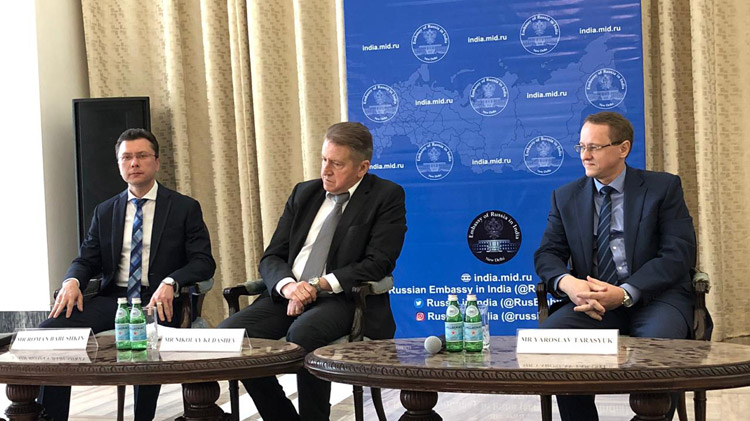- Prime Minister Narendra Modi inaugurates Aero India 2023 in Bengaluru; Releases Commemorative Stamp
- Defence Secretary meets delegations from Saudi Arabia, USA and Oman on the sidelines of Aero India 2023
- Foreign Ministers of 32 countries to attend Aero India 2023
- Embraer showcases the C-390 Millennium at Aero India 2023
Russia puts contract to build 6 more N-reactors in India on agenda for Modi visit
S-400 missile defence deal on track, as two sides explore options in Rupee-Rouble trade to evade Western sanctions.

Russia intends putting a contract to build six more nuclear power reactors in India at the centre of a wide-ranging agenda for the Summit meeting between Prime Minister Narendra Modi and Russian President Vladimir Putin at Valdivostok next week.
Moscow intends energy to be the driver of the economic relationship with New Delhi after wrapping up several big ticket defence deals, including the multi-billion S-400 missile defence system and the Gregorivich class frigates over the last year.
It has also offered to give Indian companies a share of the nuclear power projects in third countries.
"A new impetus will be given to new forms of collaboration in military and military-technical cooperation, nuclear, hydrocarbon and alternative energy, manufacturing, science and technology, agriculture, finance," Russia's Ambassador to India Nikolai Kudashev declared at a press conference in New Delhi on August 28 ahead of the Modi visit to Vladivostok, where he will also be the chief guest at the Eastern Economic Forum hosted by Putin.
Russia's Deputy Ambassador went on to suggest that Russia's cooperation with India could extend to building nuclear plants in other countries. "The Rooppur nuclear power plant model in Bangladesh could be used to build in third countries," he said, making a reference to the involvement of Indian companies with the Russian Rosatom State Atomic Energy Cooperation in the Bangladesh project
"Nuclear energy constitutes the fundamental building block for the strategic relationship," Ambassador Kudashev's deputy, Roman Babushkin elaborated at the press conference. "Russia is the only country which has built nuclear reactors in India. There are six reactors at Kundankulam. We are looking forward to a contract to construct six more nuclear power units," he said, adding that "the sites (for the new reactors) are under consideration by India".
"Russia is prepared to expand nuclear cooperation with India with up to date technologies which are the safest in the world," Babushkin added.
Russia's Deputy Ambassador went on to suggest that Russia's cooperation with India could extend to building nuclear plants in other countries. "The Rooppur nuclear power plant model in Bangladesh could be used to build in third countries," he said, making a reference to the involvement of Indian companies with the Russian Rosatom State Atomic Energy Cooperation in the Bangladesh project. These Indian companies were also involved in building the Kundankulam nuclear power plant in Tamil Nadu.
To firewall Indo-Russian deals from US sanctions, the two sides were "on the same page on utilising local currencies". "There are no bottlenecks for Rupee-Rouble trade....The US Dollar is increasingly distrusted worldwide. We want to break the monopoly and eliminate dependence on the Dollar," Babushkin said, making a reference to the setting up of branches of Russian banks like Sberbank in India to give an impetus to trade in national currencies
Another area of emphasis will be partnership between Russia's Gasprom and India's GAIL in oil and gas exploration, including in offshore sites.
Defence trade, the traditional driver of the India-Russia relationship, shall continue to be a "pillar of the strategic partnership", Babushkin said.
Russia's Deputy Ambassador emphasised that the showpiece $5.5 Billion contract for the S-400 missile defence system was on track and that "no sanctions can stop it".
To firewall Indo-Russian deals from US sanctions, the two sides were "on the same page on utilising local currencies". "There are no bottlenecks for Rupee-Rouble trade....The US Dollar is increasingly distrusted worldwide. We want to break the monopoly and eliminate dependence on the Dollar," Babushkin said, making a reference to the setting up of branches of Russian banks like Sberbank in India to give an impetus to trade in national currencies.
"We're immune to negative influences from outside," he said, expressing confidence that India and Russia would meet the target to expand bilateral trade to the equivalent of $30 Billion by 2025.
Babushkin also spoke of the agenda for Space cooperation in production of rockets and spacecraft and conducting manned flights. The Ambassador and his Deputy also emphasised partnership in infrastructure and connectivity projects. "We are eager to successfully implement huge infrastructure projects such as Vladivostok-Chennai sea route transport corridor, Northern Sea Route as well as other initiatives," Ambassador Kudashev said. Babushkin also referred to the North-South Transport Transport Corridor through Central Asia and the Nagpur-Secunderabad High Speed Railway project in India.
On the issue of the revocation of Article 370 with respect to Jammu and Kashmir by the Government of India, the Russian envoys solidly expressed solidarity with India. "It is a sovereign decision of the Indian Government (taken) within the constitutional space of India. Any dispute should be resolved bilaterally under the Shimla Agreement and Lahore Declaration. Our position is almost 100 per cent identical (to India's)," Kudashev said.





